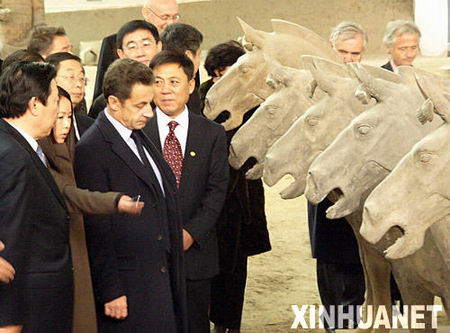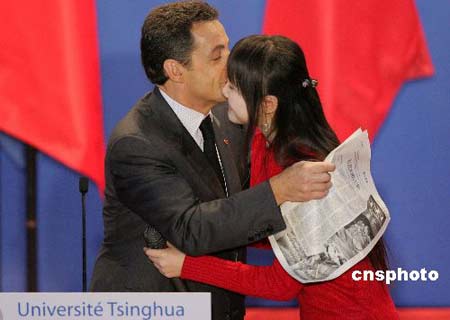On November 25, Nicolas Sarkozy kicked off his first presidential visit to China, just half a year since he took office. During his three-day stay in China, his words and actions showed how pragmatic he is about handling relations between China and France, the China Newsweek commented. His pragmatism has achieved substantial returns – 20 billion Euro worth deals that he successfully cut with China.
On November 25, French President Sarkozy visited the Terra-cotta Warrior Museum in Xi'an, Northwest China's Shaanxi Province.
A student from Tsinghua University's School of Journalism and Communication presented a college-run newspaper to French President Sarkozy.
As matter of fact, Sarkozy is no stranger to China. Over last two decades, he has visited China three times. The first visit took place in the early 1990s, a bad time for Sino-French relationship.
From early 1980s to mid-1995, Francois Mitterrand with the left-wing Socialist Party held the presidency. He often criticized China. The French first lady even invited Tibetan political exiles, including Dalai Lama, to France to conduct political activities, causing strong protests from the Chinese side. In 1989, France suspended relations of every kind and every level with China and began imposing political and economic sanctions on the country.
Two years later, the French government decided to sell six Lafayette frigates to Taiwan, a considerable disturbance to the Chinese government. That same year, Sarkozy, who at that time was the mayor of Neuilly, cultivated a very close personal rapport with Chinese diplomat. He had never been to China and was very curious about the country. He wanted to make a visit as the major of Neuilly, according to Cai Fangbai, former Chinese Ambassador to France. Cai managed to make arrangements for Sarkozy's visit in 1991. In this way, Sarkozy came to China, accompanied by his advisor, Michel Lu, an Asian-Frenchman and Sarkozy's very close friend. He visited Tiananmen Square and took pictures there. More importantly, he talked with Zhu Rongji who was then the mayor of Shanghai.
But the next year, France sold Mirage 2000 fighters to Taiwan, pulling the French-China relationship down to a nadir. That year, Sarkozy was appointed as the budget minister and spokesman of prime minister's office by then Prime Minister, Edouard Balladur. Mr. Lu suggested to Sarkozy that France attach more importance to the Chinese market; it would help boost the French economy. Sarkozy agreed and talked to Balladur about the matter. This pushed Balladur to visit China, where he salvaged the frazzled bilateral relationship.
In the 1995 French presidential election, Sarkozy supported then Prime Minister, Balladur – who ultimately lost to Jacques Chirac, Sarkozy's long time mentor. In the aftermath of the election, Sarkozy lost his job as the budget minister. He had to "cross the desert", as quoted from the French media and he was lambasted as a traitor by the new president's supporters.
But Sarkozy received an invitation from the Chinese government that year. Accompanied by his yet to be wife Cecilia, he visited Beijing and Shanghai. In Xi'an, he viewed the terra cotta warriors for the first time. He seemed to have a great time during his visit and looked as if he were coming of darkness.
In 2004, as the second highest officer in the French government, leader of the ruling party and popular presidential candidate, Sarkozy made a third China visit. The Chinese government received him ceremoniously. President Hu Jintao met him and they had a very nice talk.
This time, his fourth tour to China and his first presidential visit to the country, he changed his tour route and unexpectedly chose Xi'an for the first leg, which was the final destination for his predecessor Chirac during his last presidential visit. The Palais de l'élysée commented that Sarkozy's choice reflected the new president's considerable interest in the ancient city of Xi'an as well as his fascination with Chinese culture. In his four-hour stay in the city, the president saw the terra cotta warriors again and went to another two museums that have not yet opened to the general public.
But it seems that Sarkozy is not as fascinated with Chinese ancient culture as Chirac was. According to Nicolas Chapuis, a Sinologist as well as French envoy and attaché to China, Sarkozy is more interested in modern Chinese culture. This is why the French president put the "798 Art Zone", a well-known center for Chinese modern arts creation and exhibition, in his tight schedule.
Before Sarkozy came to China, the strike against welfare reforms had just concluded. "When I returned from China I'll explain to the public the government's corresponding measures," he said. He also hoped to gain some achievements from China so as continue to push forward his tough reforms.
On the morning of November 26, Chinese President Hu Jintao held a talk with Sarkozy. They reiterated strategic Sino-France relations. Hu said that the Chinese government always gives top priority to the Sino-France relations in its foreign policies and tries to promote their relations from a long term and strategic point of view. Sarkozy reasserted that France holds a one-China policy and opposes Taiwan independence and the planned referendum.
In his talks with Premier Wen Jiabao, Sarkozy said that the EU ban on arms sales to China is unreasonable and shall be lifted.
Practical Sarkozy won great rewards from his visit to China. China and France signed a series of contracts over 20 billion Euros, including cooperation on nuclear energy.
The WirtschaftsWoche, a German economic weekly, commented that France is taking advantage of the frictions between China and Germany and is trying to get the most out of the present relations with China.
China and France issued a joint statement declaring that the two countries will develop a partnership in dealing with climate change. This is the first time China signed a bilateral document in dealing with climate change with another country.
The French newspaper Figaro made an analysis of Sarkozy's character, saying Sarkozy is a pragmatist and is only interested in useful ideas.
After Sarkozy came into power, he puts European construction as the core of his foreign policies and hopes to make a breakthrough there in order to reverse France's declining status in Europe. France fell in status following the EU Constitution crisis and Sarkozy would like to restore his country's political power in Europe.
In China he won the opportunity to become a European leader. Many people expressed doubt about the future Sino-EU relations, believing that trade frictions might send the Sino-EU relations into a cold state. Sarkozy's visit to China demonstrates that Sino-EU relations are still heading forward. China also sends its message to the world: it not only values the traditional and friendly relations with France but also attaches great importance to the future of Sino-EU relations.
But pragmatists usually waver back and forth as their interests change.
In his foreign policy speech made on the 100th day as the president, Sarkozy mentioned China four times and took the "newly emerging nations" like China as the second greatest challenge for France. He particularly pointed out that China is entering into its most impressive restoration period during the history of mankind. But China's insatiable demands for materials have become a controlling strategy, especially in Africa.
In less than three weeks after he became the president, Sarkozy went to Africa three times because he believed that if France loses its long-term realistic and effective influence over Africa, it will subsequently lose its global influence.
How to reach a win-win situation in French "traditional spheres of influence" poses a huge challenge to both France and China.
(Source: China Newsweek, translated by Pang Li and Zhang Ming'ai for China.org.cn, December 7, 2007)



